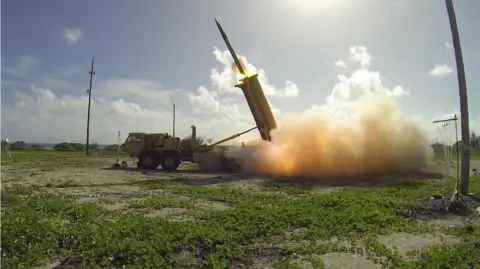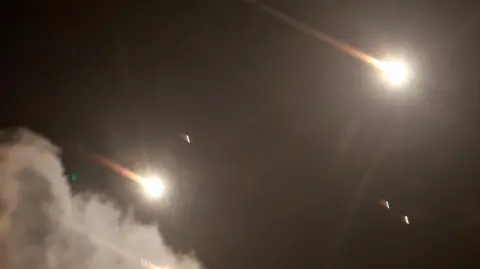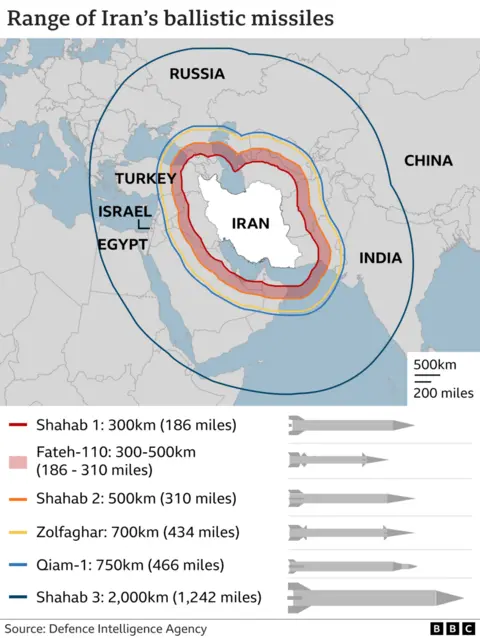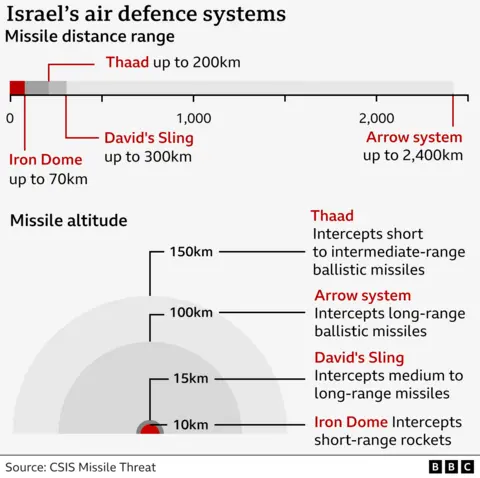Why the US is giving Israel a powerful anti-missile system

 AFP via Getty Images
AFP via Getty ImagesThe Pentagon has confirmed that it is sending an advanced anti-missile system used by the US military to Israel.
Officials say the Terminal High-Altitude Area Defense (Thaad) battery will bolster Israel’s air defenses after an Iranian missile attack on the country earlier this month.
President Joe Biden said it was aimed at “protecting Israel”, which is still expected to retaliate against Iran’s strike involving more than 180 ballistic missiles fired at Israel on October 1.
This move has become a matter of great concern as it involves putting American boots on the ground in Israel.
There is already a small number of US troops in the country – but this new deployment of about 100 troops is significant as it shows the US’ continued involvement in the regional war.
It is also being looked at for clues as to what it means for Israel’s missile capabilities as the situation escalates.
Israel has yet to start retaliating against the attack on Iran, which will be “deadly, precise and above all, surprising” according to Defense Minister Yoav Gallant.
Tehran said it fired at Israel because it had killed Hassan Nasrallah, the leader of Iran-backed Hezbollah, in Beirut.
The Pentagon said an advance team and the necessary parts for the battery arrived in Israel on Monday – with more personnel and parts to follow in the coming days. The battery will be operational “in the near future”, the statement said.
It is not clear whether the deployment of Thaad is part of a US emergency plan to cover identified gaps in Israel’s air defenses, or points to growing concern in Washington about a powerful Israeli strike on Iran.
President Biden has opposed any attack on Iran’s nuclear facilities, as well as its oil or energy infrastructure, amid fears it would cause conflict and affect the global economy.
Whatever the background of the decision, it demonstrates Israel’s further need for US defense assistance amid the escalating conflict in the Middle East.
 Reuters
ReutersBallistic missiles like the Fattah-1 used by Iran earlier this month are launched high into the Earth’s atmosphere, where they change direction and land in the direction of their target. One of their military advantages is their high speed compared to cruise missiles or drones.
The Thaad system is highly effective against ballistic missiles, according to manufacturer Lockheed Martin, the largest US arms manufacturer.
Raytheon, another American weapons company, developed its own advanced radar.
The system lists six truck-mounted launchers, with eight connectors on each launcher. It costs around $1bn (£766m) a battery and requires around 100 workers to operate it.
Thaad is widely demanded including Ukraine to counter Russian missile attacks.
Saudi Arabia has orders for it, and it is reported that it wants more as part of the American arms bonanza to get official recognition for Israel: the so-called “normalisation” agreement that was largely rejected after the 7 October attacks by Hamas.

An October 1 Iranian strike on Israel killed one man in Jericho in the West Bank, who was hit by a suspected missile strike.
Israel has a highly regarded air defense system, developed with the US, including the Arrow 2 and Arrow 3 exo-atmospheric missiles.
These fly at hypersonic speeds and can fire ballistic missiles into space. The Israeli programmers said the Arrow “performed as expected” with “good” results against the Iranian strike.
The US supported the defense operation, firing missiles from two destroyers in the eastern Mediterranean, as well as the support of other European and Arab countries.
Washington presented the strike on Iran as “defeated and ineffective”.
But the damage done to the ground told a less dramatic picture. Satellite images showed damage to the Israeli Air Force’s Nevatim base, which houses F-35 fighter jets, including craters on the runway and taxiway.
Decker Eveleth from the Washington-based Center for Naval Analyzes (CNA) said the images show 32 points, including multiple hits in the F-35’s hangar area.
“Some F-35s have been really lucky,” Mr Eveleth told X.
The Israeli newspaper Haaretz reported that it was not yet clear whether the damage was caused by missiles or explosives.
There were other direct impacts, including in Tel Aviv. One missile reportedly blew out a 30-meter (nine-meter) deep crater in a densely populated area near the headquarters of Mossad, Israel’s spy agency.

Politically, the Thaad announcement is associated with the support of the Biden administration for the “ironclad” defense of Israel.
The US shipped more than 50,000 tons of weapons to Israel last year, according to Israeli statistics.
But it also highlights another of Washington’s policy contradictions: first it tries to pressure Israel and its adversaries not to escalate the war, instead urging dialogue.
When that failed, the White House has steadfastly supported the decisions of its Israeli ally while moving to defend it diplomatically and militarily.
The Iranian missiles followed Israel’s assassination of Hamas political leader Ismail Haniyeh (negotiator of the Gaza ceasefire and hostage release), Hassan Nasrallah in Beirut, Israel’s attack on the densely populated parts of Beirut and its attack on the ground in Lebanon.
Israel said it had been attacking Hezbollah’s leadership and destroyed its missile stores as a result of 11 months of cross-border rocket fire into Israel.
It argues that only military pressure and the weakening of Hezbollah’s power will ensure that 60,000 Israelis can return to their homes in northern Israel.
The Pentagon describes the deployment of Thaad as part of “broad changes the US military has made in recent months” to support Israel and protect American personnel from attacks by Iran and Iranian-backed groups.
It says Thaad was deployed in southern Israel for exercises in 2019, the last and only time it was known to exist.
US military deployments to Israel without exercises are extremely rare, given Israel’s capabilities.
Iran’s Foreign Minister Abbas Araqchi warned on Sunday that the US is putting the lives of its soldiers “at risk by sending them to use US missile systems in Israel”.
Source link




